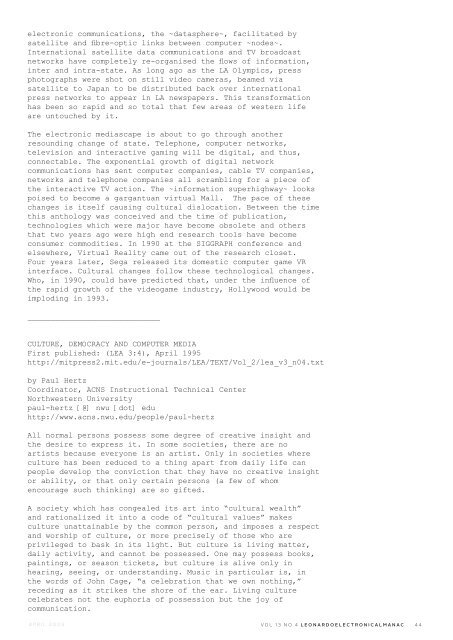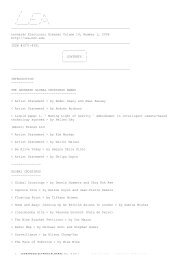Leonardo Electronic Almanac / Volume 13, No. 4 / April
Leonardo Electronic Almanac / Volume 13, No. 4 / April
Leonardo Electronic Almanac / Volume 13, No. 4 / April
Create successful ePaper yourself
Turn your PDF publications into a flip-book with our unique Google optimized e-Paper software.
electronic communications, the ~datasphere~, facilitated by<br />
satellite and fibre-optic links between computer ~nodes~.<br />
International satellite data communications and TV broadcast<br />
networks have completely re-organised the flows of information,<br />
inter and intra-state. As long ago as the LA Olympics, press<br />
photographs were shot on still video cameras, beamed via<br />
satellite to Japan to be distributed back over international<br />
press networks to appear in LA newspapers. This transformation<br />
has been so rapid and so total that few areas of western life<br />
are untouched by it.<br />
The electronic mediascape is about to go through another<br />
resounding change of state. Telephone, computer networks,<br />
television and interactive gaming will be digital, and thus,<br />
connectable. The exponential growth of digital network<br />
communications has sent computer companies, cable TV companies,<br />
networks and telephone companies all scrambling for a piece of<br />
the interactive TV action. The ~information superhighway~ looks<br />
poised to become a gargantuan virtual Mall. The pace of these<br />
changes is itself causing cultural dislocation. Between the time<br />
this anthology was conceived and the time of publication,<br />
technologies which were major have become obsolete and others<br />
that two years ago were high end research tools have become<br />
consumer commodities. In 1990 at the SIGGRAPH conference and<br />
elsewhere, Virtual Reality came out of the research closet.<br />
Four years later, Sega released its domestic computer game VR<br />
interface. Cultural changes follow these technological changes.<br />
Who, in 1990, could have predicted that, under the influence of<br />
the rapid growth of the videogame industry, Hollywood would be<br />
imploding in 1993.<br />
_____________________________<br />
CULTURE, DEMOCRACY AND COMPUTER MEDIA<br />
First published: (LEA 3:4), <strong>April</strong> 1995<br />
http://mitpress2.mit.edu/e-journals/LEA/TEXT/Vol_2/lea_v3_n04.txt<br />
by Paul Hertz<br />
Coordinator, ACNS Instructional Technical Center<br />
<strong>No</strong>rthwestern University<br />
paul-hertz [@] nwu [dot] edu<br />
http://www.acns.nwu.edu/people/paul-hertz<br />
All normal persons possess some degree of creative insight and<br />
the desire to express it. In some societies, there are no<br />
artists because everyone is an artist. Only in societies where<br />
culture has been reduced to a thing apart from daily life can<br />
people develop the conviction that they have no creative insight<br />
or ability, or that only certain persons (a few of whom<br />
encourage such thinking) are so gifted.<br />
A society which has congealed its art into “cultural wealth”<br />
and rationalized it into a code of “cultural values” makes<br />
culture unattainable by the common person, and imposes a respect<br />
and worship of culture, or more precisely of those who are<br />
privileged to bask in its light. But culture is living matter,<br />
daily activity, and cannot be possessed. One may possess books,<br />
paintings, or season tickets, but culture is alive only in<br />
hearing, seeing, or understanding. Music in particular is, in<br />
the words of John Cage, “a celebration that we own nothing,”<br />
receding as it strikes the shore of the ear. Living culture<br />
celebrates not the euphoria of possession but the joy of<br />
communication.<br />
APRIL 2005 VOL <strong>13</strong> NO 4 LEONARDOELECTRONICALMANAC 44



